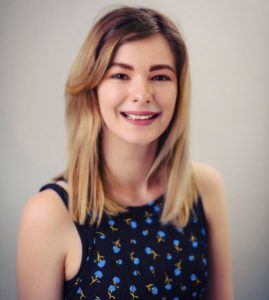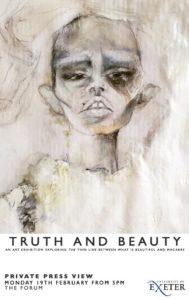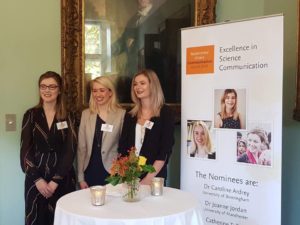 Catherine is a PhD researcher in the Centre for Research in Ageing and Cognitive Health (REACH) at the University of Exeter. Her PhD research examines how people with dementia use social media. In 2016, Catherine graduated from the University of Bath with a BSc (Hons) degree in psychology. She is a cyberpsychologist interested in online communities and health research. She is also interested in internet-mediated research ethics, digital methods, and body image. Catherine is also the Vice-Chair of PsyPAG, a national organisation for postgraduate psychologists.
Catherine is a PhD researcher in the Centre for Research in Ageing and Cognitive Health (REACH) at the University of Exeter. Her PhD research examines how people with dementia use social media. In 2016, Catherine graduated from the University of Bath with a BSc (Hons) degree in psychology. She is a cyberpsychologist interested in online communities and health research. She is also interested in internet-mediated research ethics, digital methods, and body image. Catherine is also the Vice-Chair of PsyPAG, a national organisation for postgraduate psychologists.
On Thursday 4th October, I attended Elsevier’s Early Career Researcher UK Awards ceremony at the Royal Society. I attended this event because I had been shortlisted for Elsevier’s Researchers’ Choice Communication Award. Elsevier’s Early Career Researcher Awards recognise and reward outstanding early career researchers who make a significant contribution to their field of research. I felt extremely honoured and nervous to attend this event as I was the only PhD student who was shortlisted for the science communication award. My nerves soon subsided after I met everyone, who are all friendly, like-minded people with a passion for research. Attending the event gave me the opportunity to meet a number of early-career researchers, professors, and people working for Elsevier who were able to advise me on my career. Meeting these inspirational people reinvigorated my love of research and boosted my confidence to pursue a career in this field.
What is Science communication?
Science communication is a fantastic way of enhancing public awareness of science and provides us with the opportunity to engage with and consider different perspectives (National Academies of Sciences, Engineering, & Medicine, 2017). Scientific findings should be available to all and by communicating the findings of our research, we can ensure our findings aren’t limited to a journal which is only accessible to fellow academics. There are many different ways of engaging in science communication such as using social media, engaging with journalists, giving public talks, and using the arts.
Why was I nominated?
I was shortlisted for the award because of my research which examined the culture of bonespiration – an online trend that encourages social media account holders to achieve extremely thin bodies (Open access paper available via https://jeatdisord.biomedcentral.com/articles/10.1186/s40337-017-0170-2). Following a number of radio interviews and discussions with journalists, my research received international media attention. I also worked with Devon-based artist Phillippa Mills to produce an exhibition which was influenced by my research. This was a great way of relaunching my work. It was incredible to see my research translated into art where so many people could look at the issue I highlighted from a different perspective.
Dr Caroline Ardrey, Dr Joanne Jordan, and I were shortlisted for the award. Dr Caroline Ardrey is a a lecturer in Modern Languages at the University of Birmingham. Caroline is currently in the process of putting together a new project which uses Social Network Analysis techniques from statistics and the social sciences to analyse the creative networks of Paris in the 1860s and 1870s. Through a range of events, including the launch of an augmented reality smartphone app which simulates engagement with archival materials, and a series of hackathons for school pupils, this project seeks to make research findings accessible to a wider audience.
The winner of the Researchers’ Choice Communication award was Dr Joanne Jordan. Dr Joanne Jordan’s project ‘The Lived Experience of Climate Change’ is based on research looking at urban climate resilience and how land tenure affects adaptation to climate change in Dhaka, Bangladesh. The project engaged residents of an informal settlement in the research findings, and built awareness and action on their everyday accounts of living with climate change through an interactive theatre performance. Subsequent theatre performances, documentary films, educational programmes, and public events were then used to engage a much wider set of international and national audiences. Joanne has brought her work to over 235,000 people including study participants, policy makers, practitioners, academics, students and the public.
Attending this event was a fantastic opportunity and I thoroughly enjoyed the evening. I would like to extend my congratulations to Caroline and Joanne. Even though I didn’t win the award I am extremely grateful to have been shortlisted. I hope this blog post will encourage postgraduates to not shy away from science communication!
References: National Academies of Sciences, Engineering, and Medicine. (2017). Communicating science effectively: a research agenda. National Academies Press.
Written By: Catherine Talbot, PhD Researcher in College of Medicine and Health. You can find out more about Catherine and her Research by following her on twitter @Catherinetalb


